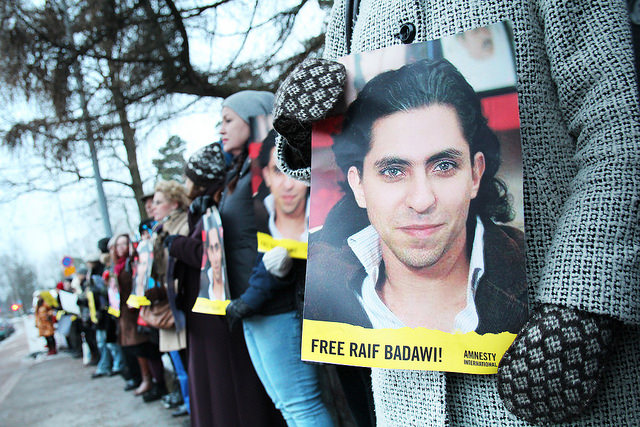Digital Citizen is a biweekly review of news, policy, and research on human rights and technology in the Arab World. Subscribe here!
BAHRAIN
Women’s rights activist Ghada Jamsheer was sentenced to 20 months in jail for posting tweets exposing corruption at King Hamad University Hospital.
EGYPT
Two Egyptian journalists were recently sentenced to prison in unrelated cases that are emblematic of the broader crackdown on the press in the country and the rollback in human rights over the past year. The editor of the independent news website Al-Bedaiah was sentenced to 15 months in prison for assaulting a police officer. In a separate case, Islam Behery, a presenter for the privately-owned Alkahera Walnas TV station, was sentenced in absentia to five years on charges of blasphemy in relation to comments made on his daily show on religious issues.
The Endowments Ministry began training 300 imams how to use WhatsApp and Facebook to get immediate advice from the ministry on how to deal with hardliners as part of the government’s initiative on countering violent extremism.
The Cairo administrative court upheld a travel ban imposed on Esraa Abdel Fattah, a blogger and journalist at the Al-Youm Al-Sabea newspaper. The decision followed a lawsuit filed by Abdel Fattah demanding the lifting of the ban, which she learnt about on 13 January when she attempted to board a flight to Germany.
LEBANON
Journalist Hayat Mirshad will not be investigated by the cyber-crime bureau, despite TV host Tony Khalife filed a libel complaint against her over a tweet in which she accused him of receiving a bribe to attack anti-domestic violence NGOs. After Mirshad refused on 15 June to appear before the bureau for its “illegal legitimacy”, the case was referred back to the publication court.
OMAN
Police arrested twenty-two protesters on 11 June for staging a peaceful sit-in in front of the Special Section of the Omani Police in Muscat, where they believe that several of the nine online activists arrested between 31 May and 9 June are being held, according to Human Rights Watch. Activists said the imprisoned bloggers had written critically about the human rights situation in the country. Amongst the imprisoned activists are three founding members of the Omani Group for Human Rights, which uses Facebook and a website to document human rights developments.
SAUDI ARABIA
The US Commission on International Religious Freedom has issued a letter to Saudi Arabia’s King Salman, requesting the pardon of blogger Raif Badawi and human rights activist Waleed Abu-Khair. On 7 June, the Saudi Supreme Courtupheld Badawi’s sentence of 1,000 lashes and 10 years in jail on charges of insulting Islam. On 9 January, Badawi received the first round of 50 lashes. The cruel punishment has since been postponed on medical grounds.
SYRIA
The pro-Assad ‘Syrian Electronic Army’ claimed responsibility for the 8 June hacking of the US Army’s website, army.mil. In the hack, the group posted a message denouncing US military training of rebels fighting the Assad regime.
UNITED ARAB EMIRATES
UAE citizens swearing at others online could now be jailed and fined $68,000, and expatriates could face deportation. This new punishment was brought to light on 16 June, after the UAE Supreme Court ordered the retrial of a man convicted of swearing at a colleague in a Whatsapp message. The man was initially ordered to pay a fine of $800. However, prosecutors have appealed the verdict and requested the $68,000 fine or imprisonment under the new law.
NEW RESEARCH
- The 7th Annual ASDA’A Burson-Marsteller Arab Youth Survey 2015, which explores attitudes among Arab youth in 16 MENA countries, found that 40% of young Arabs get their news from online sources and 25% from social media, significantly more than newspapers and radio but less than TV at 60%, with the GCC home to the largest number of social media users per capita
- The Economic and Social Commission for Western Asia (ESCWA) published a report on Arab cybercrime legislation
- Article 19 published a report on disability and access to information in Lebanon
IN OTHER NEWS
- Saudi Arabia is attempting to direct “YouTube imams” to voice support for its ongoing war in Yemen
FROM OUR PARTNERS
- SMEX has launched a call for applications for an online course in citizen and community journalism
- In this post, SMEX reveals how two Lebanese operators are forcing users to pay for a service they never requested
- Newsweek published a story on 7iber fighting censorship online
- EFF released its annual Who Has Your Back? report, ranking companies on how they respond to government requests
Digital Citizen is brought to you by Advox, Access, EFF, Social Media Exchange, and 7iber.com. This month’s report was researched, edited, and written by Afef Abrougui, Jessica Dheere, Mohamed ElGohary, Wafa Ben Hassine, Mohamad Najem, Courtney Radsch, Thalia Rahme, and Jillian C. York and translated into Arabic by Mohamed ElGohary and into French by Thalia Rahme.
Photo: Protest demanding freeing Raif Badawy – Amnesty International (CC BY 2.0)


